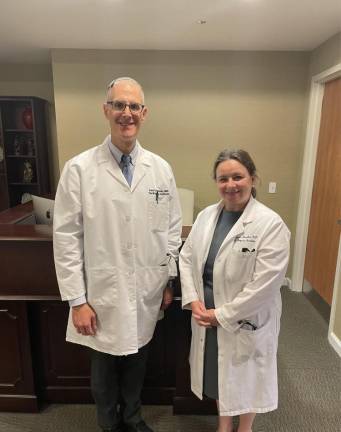High Blood Pressure and Your Kidneys
You know hypertension is bad for your heart and brain, but did you know it can lead to kidney damage?

Many people know that high blood pressure (or hypertension) puts them at higher risk for heart attacks and strokes. What they don’t know is that high blood pressure is also a leading cause of kidney damage leading to a loss of kidney function and kidney failure.
How Your Kidneys Work
Most people have two kidneys that remove waste products and extra fluid from the blood. In order to clean the blood, the kidneys need a large amount of blood to be delivered through large tube-like blood vessels into smaller vessels within the kidneys called nephrons. Each nephron receives its blood supply through even smaller vessels called capillaries, which are the smallest of all blood vessels. The nephrons then remove waste products from the blood, thus creating the urine that finally eliminates the waste products from the body. The capillaries and larger blood vessels are all potentially damaged by high blood pressure.
How Does High Blood Pressure Cause Kidney Damage?
When blood vessels become damaged by high blood pressure, the kidneys do not receive the oxygen and nutrients they need to function properly. Over time, high blood pressure causes the blood vessels to become smaller, harder and weaker, resulting in kidney damage. When the larger blood vessels are damaged, they cannot deliver enough blood to the smaller vessels. For many people, the kidney damage that results can become severe enough to cause kidney failure.
* Kidney failure causes the kidneys to lose their ability to filter blood and regulate the fluid, hormones, acids and salts in the body.
* Damaged kidneys do not control blood pressure normally. Healthy kidneys produce a chemical known as a hormone to help the body control blood pressure. Kidney damage and uncontrolled high blood pressure each contribute to a breakdown in normal functioning. As more vessels become blocked and stop functioning, the kidneys think they need to increase the blood pressure so they produce more of the hormone. This can eventually lead to kidney failure.
If I Have High Blood Pressure, How Can I Prevent Kidney Disease?
* To prevent kidney damage from high blood pressure:
*Try to keep your blood pressure controlled.
*Make sure you get your blood pressure checked on a regular basis.
*Take the medication your doctor prescribes.
* Check your blood pressure at home.
* Eat a low salt diet.
* Stay active
* Maintain a healthy body weight.
Who Is At Risk for Kidney Disease Due to High Blood Pressure?
Kidney disease caused by high blood pressure can happen to anyone. However, certain groups of people are at higher risk, including:
* African-Americans
* Hispanic-Americans
* Native Americans
* Natives of Alaska
* People with diabetes
* People with family history of high blood pressure
* People with family history of kidney disease
What Are Common Symptoms of Kidney Disease?
* High or worsening blood pressure
* Decrease in amount of urine or difficulty urinating
* A need to urinate more often, especially at night
* Swelling (fluid retention), especially in the lower legs
How Is Kidney Disease Diagnosed?
As with high blood pressure, you may not know that you have kidney disease. Certain tests can show whether your kidneys are working normally. In the blood, serum creatinine and blood urea nitrogen (BUN); can indicate kidney damage if either one is higher than normal. In the urine, blood or extra protein can be a sign of kidney damage.
How Is Kidney Disease Treated?
Treatments need to be individualized as there is no one size fits all approach to blood pressure control. For patients who have high blood pressure which has caused kidney disease, the most important treatment is to control your blood pressure through taking medications if prescribed and lifestyle changes as mentioned above. Certain types of blood pressure reducing medications, called ACE inhibitor and angiotensin II receptor blocker (ARB) can control your blood pressure and also protect the kidneys from further damage, especially in diabetics.
Kidney failure due to high blood pressure happens over time, sometimes years. But, you can reduce your risk of kidney failure by managing your blood pressure and getting checked regularly.
Dr. Perlman, a nephrologist, and Stephanie Donahue, NP, provide diagnosis and expert management of all types of kidney disease and hypertension at the Rogosin Institute. Call 1-888-ROGOSIN for an appointment.